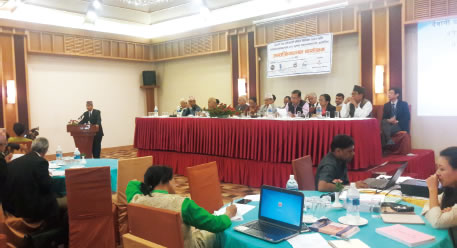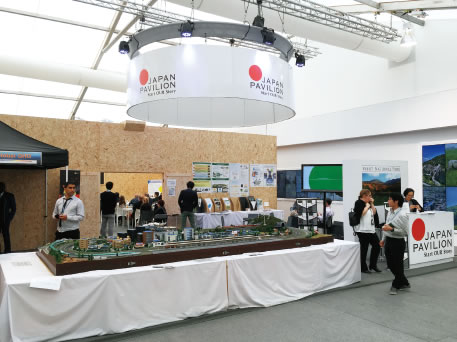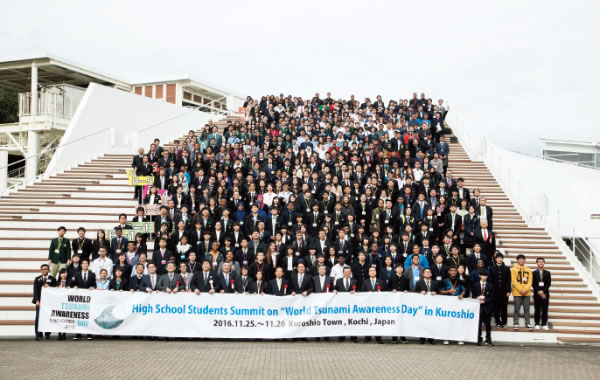Section 4 Realization of a Peaceful and Secure Society and Addressing Global Challenges
•The rule of law
Establishment of the rule of law, promotion of good governance, promotion and establishment of democratization, and respect for basic human rights including the rights of women with development of infrastructure (socio-economic foundations) are the key to advancing development in a stable manner with the “quality growth” of developing countries. In particular, the rule of law is the essential foundation for realizing a fair and equitable society in a country, domestically, and at the same time it forms the basis for friendly and equal relations between states in external relationships. Japan has stipulated strengthening the rule of law in the international community as one of the pillars of its foreign policies, and contributed to strengthening the rule of law in each country through supporting legal and judicial reform and other related assistance. Japan’s cooperation for promoting the rule of law assists the self-help efforts of developing countries based on ensured good governance and contributes to build a base that is essential to lead sustained growth, through assistance for initiatives aimed at lawmaking as well as developing legal and judicial systems in developing countries, and the understanding and consolidation of said rule of law institutions in those countries.
Rational rules reflecting the will of the citizens must be brought into force, administered, and managed fairly and properly in order that developing countries can achieve goals such as economic growth, the guarantee of human rights, and poverty reduction and that people there can lead rich and peaceful lives. Japan is assisting initiatives for the development and improvement of legal and judicial systems in each developing country, focusing on developing human resources and tailored to the identified needs and issues in each country, through an all-Japan approach involving JICA, the Ministry of Justice (MOJ), the Supreme Court of Japan, the Japan Federation of Bar Associations, university staff, etc.
The country in which Japan first implemented assistance for the development of legal systems using ODA was Viet Nam. The Government of Viet Nam introduced the Doi Moi (Renewal) policy in 1986, and commenced development and revision of civil and commercial laws in order to switch to a market economy. In the context of this series of developments, Japan responded to a request from the Government of Viet Nam and commenced assistance for the development of legal systems using ODA in 1996, and used the methods such as dispatching the legal experts of Japan to Viet Nam and accepting Vietnamese trainees in Japan to provide assistance for the drafting of the civil laws and civil procedure laws that form the foundation of a country and for the development of the human resources that would actually manage the laws and regulations. As one example of these long years of assistance bearing fruit, Lê Thành Long studied at Nagoya University from 1999 through the trainee acceptance system based on Japan’s ODA and has been highly successful, earning his doctorate in 2003 and becoming Minister of Justice in Viet Nam in April 2016.

A public consultation on the five major bills including a draft of the civil law held in Kathmandu, Nepal (Photo: Takako Nagao)
In Nepal, a civil war between the government and the Maoist anti-government forces, triggered by a popular movement calling for democratization at the beginning of the 1990s, lasted for ten years from 1996 to the conclusion of a comprehensive peace agreement in 2006, and during that period many Nepalese people lost their lives. In order to support their national efforts of democratization in Nepal after the civil war, Japan recognized the necessity of assistance for a variety of issues in the development of legal systems in Nepal such as needs of modern society, the gap between the new constitution and laws, the legal positioning of religious elements, and assisted lawmaking including the drafting of civil law, while carefully holding consultations between an advisory group comprised of experts from Japan and members of the legal profession in Nepal. (Refer to “Stories from the Field”.)
Based on the government’s basic policies regarding assistance for the development of legal systems which were revised in May 2013, Japan has extended assistance for the development of legal and judicial systems giving priority to eight countries in Asia (Indonesia, Viet Nam, Myanmar, Mongolia, Cambodia, Laos, Uzbekistan, and Bangladesh). In addition to that, Japan is implementing such assistance to African countries, by dispatching judicial advisors to Cote d’Ivoire, helping to establish call centers that provide legal information to the citizens, and organizing criminal justice training for criminal justice officials for eight neighboring countries in West Africa, including Cote d’Ivoire, and the training has been held both in Japan and in Cote d’Ivoire. These forms of assistance not only contribute to the establishment of rule of law systems that ensure an environment for free socio-economic activities as well as the stability of society in the partner countries; the support also makes it easier for foreign companies, including companies from Japan, to run venture businesses in those countries, which leads to the provision of advantages for the entire international community.
Japan has extended its support in the areas of governance, including promoting the rule of law, to approximately $2.7 billion over the ten years from 2005 to 2014.
Ensuring law enforcement is also important for establishing the rule of law with consistency. Japan is assisting capacity building of the customs and the police for government measures for anti-corruption, to control exports and imports weapons, and to combat human trafficking, other organized crimes, and terrorism. Furthermore, Japan is a maritime nation. In order to implement the rule of law at sea, Japan provides assistance for improving the law enforcement capacity of maritime security authorities in developing countries, through ODA and other assistance schemes with the donation of ships, technical assistance and capacity building of human resources.
•Free and Open Indo-Pacific Strategy
Prime Minister Abe announced the Free and Open Indo- Pacific Strategy on the occasion of the keynote speech at TICAD VI held in Kenya in August 2016. This strategy is based on the belief that a key for stability and prosperity of the international community is dynamism created by the combination of the “two continents”: rapidly growing Asia and Africa that possesses huge potential of growth; and “two oceans”: the Pacific and the Indian Oceans, which are free and open. By envisioning this dynamism as an overarching and comprehensive concept, Japan will broaden the horizon of Japanese diplomacy.
Confidence, responsibility and leadership have been fostered in Southeast Asia and South Asia as democracies, and rule of law and market economies have already taken root. It is important to spread this success of Asia through the “free and open Indo-Pacific” to the Middle East and Africa to bring out its potential, or to encourage stability and prosperity in the entire region by improving the “connectivity” of Asia, the Middle East, and Africa. Specifically, starting from East Asia and going through South Asia, the Middle East, and then to Africa, Japan will implement various assistance such as for infrastructure development, trade and investment, development of the business environment, economic and social development, and human resources development in an integrated manner. For African countries, Japan will provide assistance for nation-building that respects the ownership of the partner countries with regard to not only the development perspective but also political and governance perspectives.
When implementing these kinds of strategies, the role of ODA is particularly important. For example, in order to realize the “vibrant and effective connectivity” that revitalizes the movement of goods and people in a region, Japan utilizes ODA not only to enhance physical connectivity through quality infrastructure investment such as the Mumbai-Ahmedabad High Speed Railway in India, but also to advance assistance for strengthening institutional connectivity such as facilitating customs clearance. Furthermore, it is also essential for human resources to skillfully use these kinds of infrastructure and systems, therefore Japan will proactively develop industrial human resources and highly skilled human resources, and strengthen people-to-people connectivity by providing support for human resource exchanges and building networks among Japan, Asia and Africa.
Moreover, it is extremely important to enhance the connectivity of the region, create economic spheres as integrated “dimensions” rather than spots or lines, and invigorate trade and investment to exert the potential of the region to the maximum extent. This will bring about a Win-Win relationship for both Japan and the international community. Japan intends to continue its contribution to the peace, stability and prosperity of the international community by utilizing ODA strategically under the Free and Open Indo-Pacific Strategy.

•Assistance for stabilization of the Middle East
In the Middle East, the number of Syrian and Iraqi refugees and internally displaced persons remains at a high level, and they are kept in inhumane conditions. Furthermore, the burden of the countries hosting those refugees is increasing, and there are serious concerns that violent extremism will spread as a consequence of ongoing political chaos and a high rate of youth unemployment, especially in the North African countries. It is essential not only to provide humanitarian assistance but also to encourage addressing the root cause of the provision of destabilization in the Middle East by providing support for reconstruction and development, in particular to alleviate poverty, disparities, and youth unemployment from a medium- to long-term perspectives.
At the G7 Ise-Shima Summit held in May 2016, Japan announced that it would provide support of approximately $6 billion in total, including capacity building for around 20,000 people over the next three years under the philosophy of “The Best Way is to Go in the Middle” in order to prevent the expansion of violent extremism and build a “tolerant and stable society” in the Middle East. (Note 4) Furthermore, the G7 pledged more than $3.6 billion including Japan’s new commitment of $500 million, in support of Iraq’s efforts to combat terrorism, to address its fiscal challenges and to strengthen its economy. In addition, Japan announced its intention that it would dispatch the J-TRaC, a humanitarian assistance team consisting of JICA experts and volunteers to the refugee camps, host countries and communities, and accept up to 150 Syrian students studying abroad.
•Countermeasures for climate change and global issues

The Japan Pavilion at the COP22 venue in Marrakech, Morocco. A diorama introducing Japanese low-carbon technology is on display (Photo: Ministry of Environment)
Global environmental issues have a serious impact on sustainable development, and they have already exceeded the level at which they can be solved through the efforts of one country. In order to prevent global warming, it is essential that all countries make efforts for the reduction of greenhouse gas (GHG) emissions, but the reality is that many developing countries need to make efforts to pursue their own economic development. In addition, these developing countries cannot implement sufficient countermeasures only with their own funds and implementation capabilities. Therefore, the international community will proactively provide assistance to developing countries to promote global climate change countermeasures.
Climate change countermeasures are broadly classified as “mitigation” measures and as “adaption” measures. The former aim to reduce GHG through energy conservation, promotion of the use of low-carbon energy such as renewable energy, and the latter for preventing and alleviating the negative impacts caused by climate change (examples: sea level rise, droughts). To date Japan has been actively implementing assistance for developing countries in the areas of both “mitigation” and “adaptation.”
The 21st Conference of the Parties on Climate Change (COP21) adopted the Paris Agreement, a new framework to replace the Kyoto Protocol, in 2015 after many years of negotiation, and in COP21 Prime Minister Abe declared that projects to combat climate change worth ¥1.3 trillion a year would be implemented by Japanese public and private sectors in developing countries in 2020. This opened a path to realization of the goal of “mobilization of $100 billion from both public and private sectors by 2020” by developed countries (decided in COP16 in 2010), and greatly boosted the agreement and adoption of the Paris Agreement. Furthermore, related initiatives proceeded steadily in 2016 as well, as the developed countries announced the “Roadmap to $100 billion” in October and the developing countries welcomed this in COP22 in November.
Japan will continue to collaborate with the related countries to realize the goals for 2020, in particular keeping in mind the areas in which Japan is proficient, including geothermal power, urban railways, infrastructure for disaster risk reduction, securing water, etc., and will proactively provide assistance to developing countries in these areas.

High school students from 30 countries, including Japan, participated in the High School Students Summit on “World Tsunami Awareness Day” in Kuroshio, Kochi Prefecture in November 2016 (approximately 110 students from Japan and 250 students from overseas participated).
Furthermore, Japan is proactively tackling other global challenges, including disaster risk reduction.
In March 2015, Japan held the Third UN World Conference on Disaster Risk Reduction in Sendai. Japan is proactively promoting cooperation on international disaster risk reduction, including having led the adoption of the Sendai Framework for Disaster Risk Reduction 2015-2030 which stipulates the international framework regarding disaster risk reduction until 2030, and announced the Sendai Cooperation Initiative for Disaster Risk Reduction as its own initiative.
Furthermore, Japan proposed World Tsunami Awareness Day to raise awareness of the threat of tsunami at the global level and minimize the damage caused by tsunami, and the proposal was adopted by consensus at the United Nations General Assembly in December 2015 after being jointly proposed by 142 countries. In response to this, a range of meetings to educate people about tsunami, evacuation drills, etc. was held in regions around the world in 2016. Moreover, in November the “High School Students Summit on World Tsunami Awareness Day in Kuroshio” was held in Kuroshio, Kochi Prefecture, and approximately 360 high school students from 30 countries including Japan participated. The high school students who participated learned about Japan’s history of tsunami and disaster risk reduction efforts, gave presentations on issues for the future and the efforts underway in their countries, and adopted the outcome document for the entire summit, the Kuroshio Declaration.
•Assistance for counter-terrorism measures
The globally growing threat of terrorism is a serious factor impeding economic and social development. For that reason, greater collaboration and cooperation are required for today’s international community, and not only improving counter-terrorism capacity but also taking measures to counter violent extremism that is its root cause have become urgent issues. With an awareness of these problems, Japan, as the country holding the presidency of the G7 Ise-Shima Summit in May 2016, led the discussions towards the release of the “G7 Action Plan on Countering Terrorism and Violent Extremism”, which focuses on the issues that the international community should address in particular and consists of three pillars: (i) counter-terrorism measures, (ii) empowerment of alternative voices to violent extremism and tolerance in society, and (iii) capacity building assistance. Furthermore, in July Japan announced that it would implement assistance of $120 million, including human resources development for 30,000 people, from 2016 to 2018 in order to strengthen counter-terrorism capacity in Africa. Moreover, at the Japan-ASEAN Summit Meeting in September, Japan announced that it would provide approximately ¥45 billion over the next three years for Asia as comprehensive counter-terrorism measures consisting of (i) improvement of counter-terrorism capacity, (ii) measures to counter violent extremism, which is the root cause of terrorism, and (iii) social and economic development assistance for creating a foundation for a moderate society, and that it would also help develop 2,000 personnel for counter-terrorism over the next three years.
Furthermore, it is mentioned in the Final Report of the Council on Safety Measures for International Cooperation Projects published in August in response to the terrorist attack in Dhaka in July 2016 that Japan will proactively provide assistance to developing countries for enhancing counterterrorism measures and building their security capacities.
In order to realize these goals in a concrete way, Japan provides multi-layered and effective assistance consisting of bilateral cooperation such as technical cooperation, grant aid and loan aid, and effective combinations of cooperation through international organizations.
For example, in order to prevent the flow of terrorists and foreign terrorist fighters, Japan has commenced collaboration and cooperation with other G7 countries and related international organizations regarding assistance aimed at enhancing the use of INTERPOL’s stolen and lost passport database by border agencies. Japan is also working to strengthen the border security of other countries through cooperation taking advantage of the strengths of Japan, namely cutting-edge technology in such areas as biometric authentication and detection of explosive materials.
Furthermore, Japan has been working on economic and social assistance for building a moderate society as well as supporting the activities of civil society aimed at preventing radicalization.
Japan will work with the international community to tackle the issues of terrorism and violent extremism in a more proactive manner.
- Note 4: Government representative Fukuda also made this declaration at the World Humanitarian Summit immediately before the G7.
